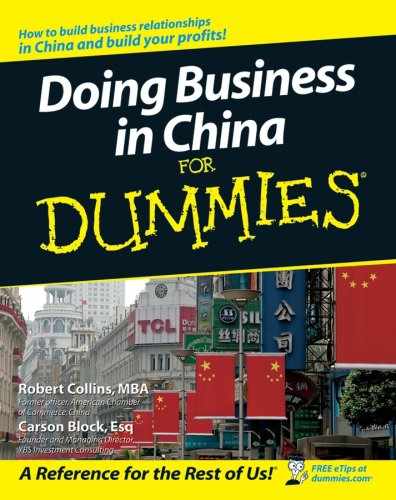Doing Due Diligence
The best way to manage risk is to avoid it! Basically, look before you leap and carry out due diligence (DD) whenever possible. Basically, due diligence means investigating potential aspects of your business, such as partners or assets you’re acquiring. How far you go with DD depends on your particular situation. You have to balance the costs and time, along with how much cooperation you can get from the other side, against the potential risks of the transaction.
Liability can come out of the woodwork in China. Consult with professionals experienced in China in the various DD areas to understand your risks before making any decisions on DD.

The basics: Reviewing the business license
When dealing with another company, look at its business license. The business license is a document that all companies in China must obtain from the Administration for Industry and Commerce (AIC — see Chapter 7).
You can either ask the company to provide its license or hire a lawyer to check at the AIC in the city where the company is registered. If a lawyer carries out the check at the AIC, he or she can do so without the company’s knowledge. The business license reveals several basic pieces of information about the company:
| ✓ | Validity: Find out at a minimum whether the company you’re dealing with is validly established and exists. |
| ✓ | Business scope: Check the company’s business scope to see whether it’s operating within it. A company that operates outside of its business scope risks shutdown. (Chapter 7 can fill you in on scope.) |
| ✓ | Signatory authorizations: Find out who’s authorized to sign contracts on the other company’s behalf. When signing a contract, the other side’s authorized signatory ideally executes it. However, if the person who’s going to execute the contract isn’t an authorized signatory, you want him or her to either bring along a duly executed power of attorney (that you’ll keep a copy of) and/or have the company chop (stamp) the contract. (A chop is an official company seal that must be manufactured by a licensed chop producer. For more on chops, see Chapter 7.) Of course, having both the power of attorney and the chop is better than having just one of the two. |
| ✓ | Ownership: The business license tells you who the owners are. You may find that the legal owners aren’t who you thought they were. In such cases, you need to consult with your lawyers to determine whether this situation can have a material effect on your transaction. |
| ✓ | Capitalization: You also see the company’s registered capital, which is important for figuring out how well capitalized the company is in case something goes wrong. |
| If you don’t think the other side’s finances are strong enough to protect you in the event of a problem, you may be able to get the owner(s) of a private company to guarantee potential liabilities. This technique isn’t foolproof, but it may provide more comfort. |
Practicing DD for joint ventures
When you’re looking at setting up a joint venture (JV), the DD should be especially thorough. Usually, the Chinese partner contributes assets and/or workers to the JV. You need to have financial professionals confirm that the assets are worth what the partner claims they are (trying to overvalue their capital contributions isn’t uncommon). Technical people should assess the assets to see whether they’re in good working order and can do what they’re supposed to do.
The legal team should check the titles to the assets and see whether any liens against them exist. Assets are sometimes titled to entities or persons other than the JV partner. If the partner is contributing workers, the legal team should also assess whether there are any potential liabilities from unpaid social benefits, improperly terminated labor contracts, and so on.
Doing DD for hiring individuals
How little investigation many foreign investors carry out on people they hire or consider working with is surprising. Rogue general managers (GM) are a real problem in China. Although only a small percentage of GMs are rogues, they cost their employers enormous sums of money by lining their own pockets and damaging the company’s operations.
Identifying a rogue isn’t as easy as you may think — many of them are able to go from one company to the next without anybody being the wiser until the stuff hits the fan. Rogues can be Chinese or expatriate — nationality doesn’t make a difference. When most rogue GMs get caught, they’re able to negotiate a glowing reference letter in return for not doing further damage to the company. Make sure you thoroughly check out your GM and other key potential hires (such as financial controllers) before making a hiring decision. You should at least call their references and previous employers.
If you really want to cover your bases, some firms specialize in conducting background investigations. Among the firms offering this type of service are large Western companies, such as Kroll (www.kroll.com).

